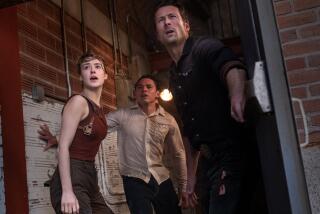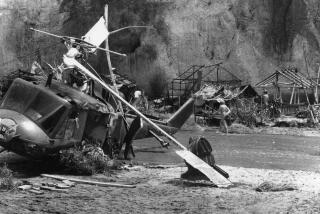A ‘Night’ of Titanic Proportions
- Share via
You can have all those tarted-up disaster movies of the 1970s--”The Towering Inferno,” “The Poseidon Adventure,” the procession of “Airport” potboilers. A few spiffy special effects, a handful of flavor-of-the-month stars (remember O.J. Simpson playing a cop?), a cliffhanger scene every seven or eight minutes.
None of them can compete with the real thing, or even a dramatization of the real thing, particularly when it’s put together with restraint, a matter-of-fact tone and an abiding faithfulness to history.
Such is “A Night to Remember,” what might be called the first disaster movie. Released in 1958, three years after the publication of Walter Lord’s book of the same name, “A Night to Remember” offers all the historical accuracy and reliance on Lord’s research into the sinking of the Titanic without tarring the plot with melodrama.
There are blessedly few subplots here--no shipboard romances for dramatic effect, no shady characters or women of mystery. Recognizing, as Lord did, that the loss of the most magnificent ship afloat--a ship packed to the davits with the cream of London and New York society, captains of industry and sons and daughters of the most glittering of the great families of Europe and America--provided more than enough drama, Roy Baker directed with a light hand and an ear for true dialogue.
The mostly British cast will likely be unfamiliar to many Americans (with the exception of David McCallum, Honor Blackman, and, possibly, Alec McCowen, who has a fine turn as the ship’s ingenious baker with an instinct for survival), but they are a well-drilled ensemble. They reflect the courage, cowardice, foolishness and Edwardian morality of the time with believable accuracy.
“A Night to Remember” (1958), directed by Roy Baker. 123 minutes. Not rated.
MORE VIDEOS:
“Judgment at Nuremberg” (1961), directed by Stanley Kramer. 178 minutes. Not rated. Where “Schindler’s List” addressed itself to the “what” of the Holocaust, “Judgment at Nuremberg” draws on the “why”--in this case, why would a group of highly respected German judges preside during the war over a series of infamous kangaroo courts, drumhead courts-martial and false condemnations that resulted in the deaths of thousands? Spencer Tracy is brilliant as the presiding American judge at the trials of the German judges; Burt Lancaster is in the dock. Also in the cast are Marlene Dietrich, Richard Widmark, Judy Garland and Montgomery Clift.
More to Read
Only good movies
Get the Indie Focus newsletter, Mark Olsen's weekly guide to the world of cinema.
You may occasionally receive promotional content from the Los Angeles Times.






